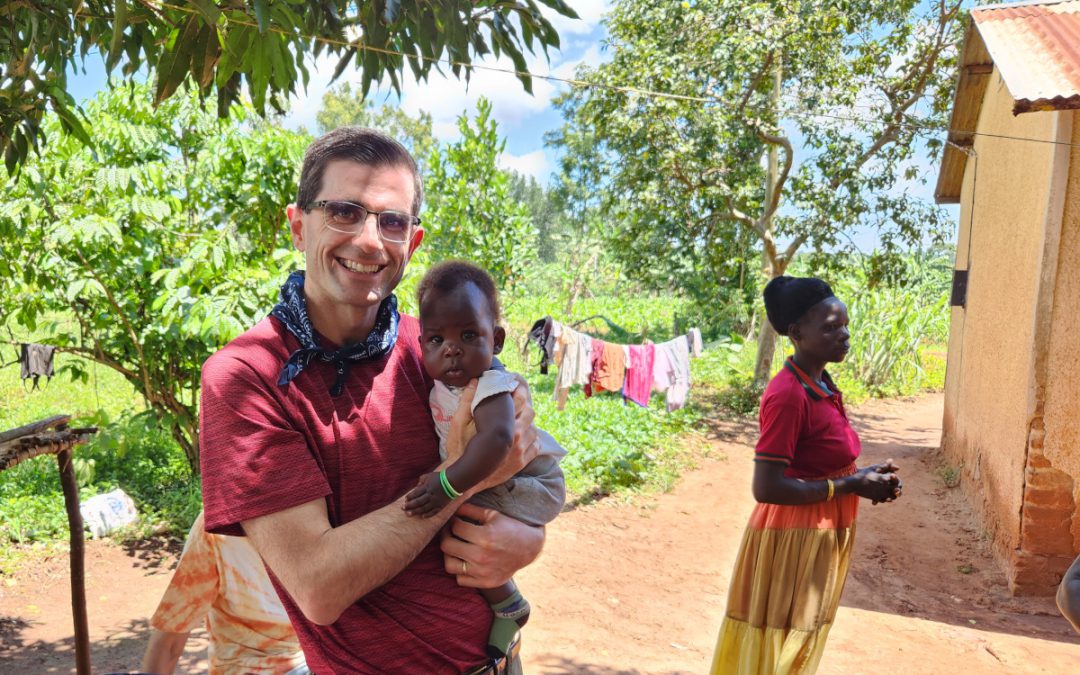School
A Need Arises
In the 1920s, 30s, and 40s, many Ugandans agreed to sell a bucket of soil to foreigners. Since the Ugandans couldn’t read or write, they signed the contract by placing their thumbprint on the signature line. Yet the contract was not for some soil but for their land. Because they couldn’t read, they fell prey to trickery and descended into poverty.
A School is Born
When Godfrey Nkutu (nn-KOO-too) visited his childhood home in the district of Mayuge (may-YOU-gay), his heart would cry at the ongoing poverty, illiteracy, and cruelty. In 2019, Godfrey joined forces with Gary Christman and started a school called the Mayuge Christian Education Center.
The school’s logo is a canoe floating in a lake. A large body of water like Lake Victoria is a dangerous place to be, and drowning is a real threat. A life without Jesus or education can drown in poverty and hopelessness. The MCEC is the canoe where, with Jesus, drowning people can reach the safety of shore.
A Partnership Begins
In 2020, Gary left the MCEC to raise money and awareness for the school by starting a non-profit in the US. He invited me to go to Uganda with him to check the school out, and I went in September 2022.
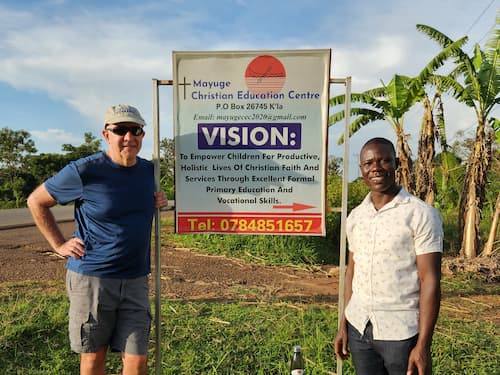
Gary Christman and Godfrey Nkutu
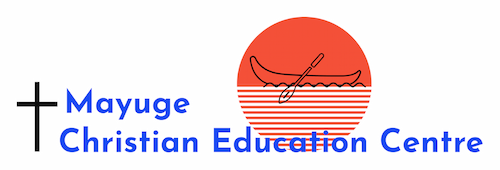
A Need Arises
In the 1920s, 30s, and 40s, many Ugandans agreed to sell a bucket of soil to foreigners. Since the Ugandans couldn’t read or write, they signed the contract by placing their thumbprint on the signature line. Yet the contract was not for some soil but for their land. Because they couldn’t read, they fell prey to trickery and descended into poverty.
A School is Born
When Godfrey Nkutu (nn-KOO-too) visited his childhood home in the district of Mayuge (may-YOU-gay), his heart would cry at the ongoing poverty, illiteracy, and cruelty. In 2019, Godfrey joined forces with Gary Christman and started a school called the Mayuge Christian Education Center.

Gary Christman and Godfrey Nkutu
The school’s logo is a canoe floating in a lake. A large body of water like Lake Victoria is a dangerous place to be, and drowning is a real threat. A life without Jesus or education can drown in poverty and hopelessness. The MCEC is the canoe where, with Jesus, drowning people can reach shore.

A Partnership Begins
In 2020, Gary left the MCEC to raise money and awareness for the school by starting a non-profit in the US. He invited me to go to Uganda with him to check the school out, and I went in September 2022.
Arrival
When we drove down the grassy driveway into the center, we heard cheers, and a woman shouted, “Aye-yai-yai-yai-yai!” The shout is called endulu (en-DOO-loo), and they do it when they’re excited and happy. It sounds like this:
Several women and children greeted us, and a few knelt in front of Godfrey and Gary.
I was not expecting that.
Kneeling as a sign of respect is practiced in central and eastern Uganda, particularly in rural areas, where the pace is slower.
Tailoring Class
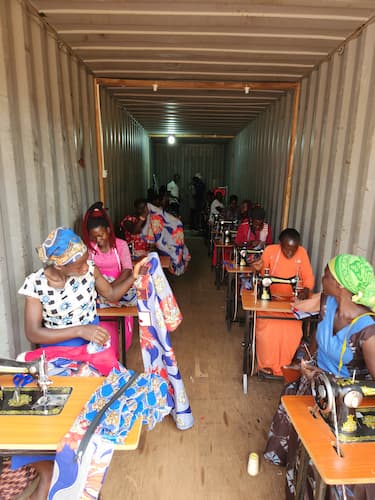
The fifteen women in the vocational tailoring class gathered between two shipping containers. We slipped into the back seats where the school’s pastor, Sam, was speaking, and the tailoring teacher, Steven, was translating. Although English is common in Uganda, it’s not the primary language. In villages where poor education is prevalent, fewer people speak English. So, Sam would speak in the regional dialect, Lusoga (loo-SOH-gah), and Steven would translate to English. Sometimes, they’d flip-flop.
As their guests, Sam invited us to stand and speak. Godfrey translated for us. A little nervous and unsure what to say, I just introduced myself and expressed my pleasure to meet everyone.
Afterward, they sang praise songs in Lusoga with lots of clapping, some dancing, and a few endulus.
They moved into one of the shipping containers where they had fifteen foot-pump sewing machines lined up. They’d been sharing five until the kids in the Durham Evangelical Church VBS program raised enough money to buy them ten more.
Steven showed us two electric sewing machines—scarce in that part of the country. There might be only one other in Mayuge.
Several children hung out at the mouth of the container while their mothers sewed. As we talked (barefoot to minimize dirt, because the floor is the only surface big enough to spread out fabric for measuring), I felt tiny fingers grazing the tops of my toes. I looked over, and an adorable little girl pulled her hand away and smiled. White people are rare in Uganda. I may have been the only white person she’d ever touched.
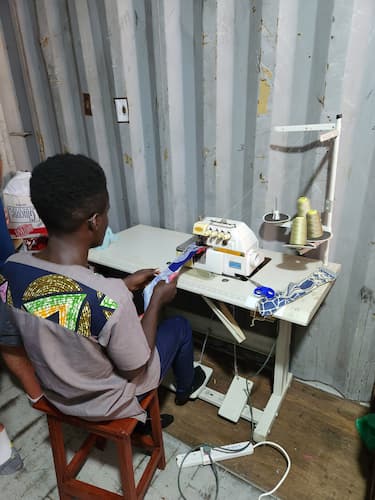
Steven with an electric sewing machine
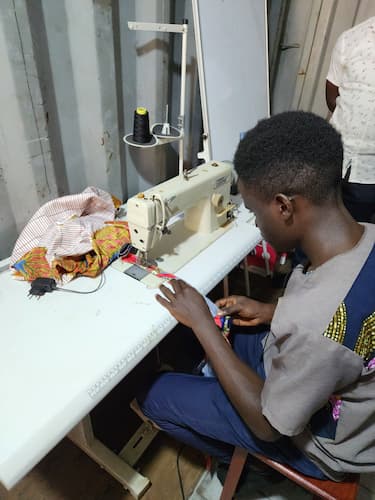
Steven with another electric sewing machine
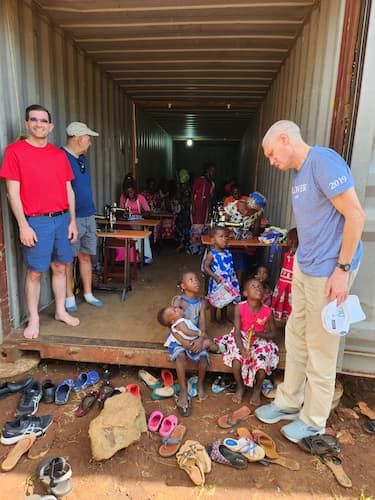
(Left to right) Me, Gary, the class, their children, Len
Several children hung out at the mouth of the container while their mothers sewed. As we talked (barefoot to minimize dirt, because the floor is the only surface big enough to spread out fabric for measuring), I felt tiny fingers grazing the tops of my toes. I looked over, and an adorable little girl pulled her hand away and smiled. White people are rare in Uganda. I may have been the only white person she’d ever touched.

(Left to right) Me, Gary, the class, their children, Len
The Tour
Godfrey gave us a tour of the property. In the front was the school, a chicken coop, a yard, his sister’s house, and his cousins’ house next door. Behind his sister’s house, amid banana trees, lay the graves of Godfrey’s father and two brothers.
He showed us the garden in the rear of the property. Their small farm grew coffee, jackfruit, beans, sweet potato, avocado, mango, bananas, and plantains, which they call matoke (muh-TOH-kee).

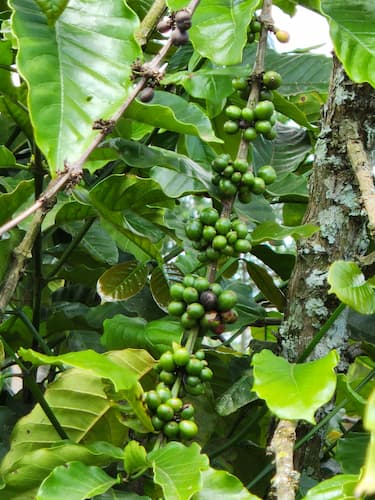
Coffee
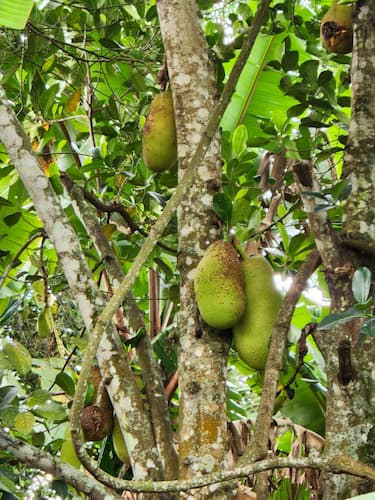
Jackfruit
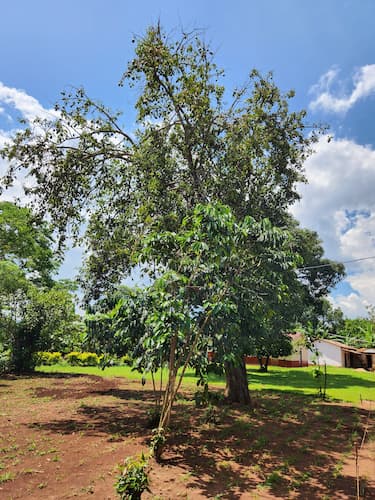
Avocado Tree
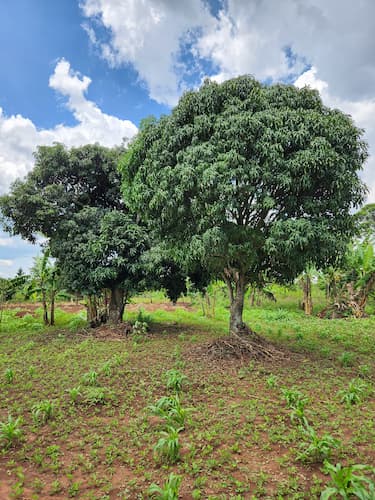
Mango Tree

Coffee

Jackfruit

Avocado Tree

Mango Tree
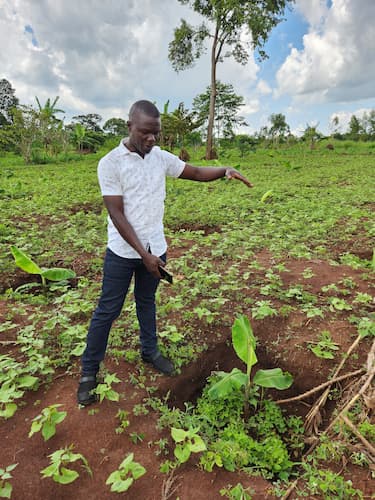
Standing among new bean plants, Godfrey shows how tall this plantain tree will grow in 3 months.
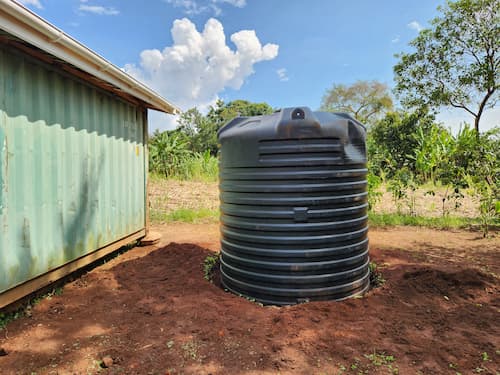
Beside the shipping containers, they’d placed a 10,000-liter (2600-gallon) drum for collecting rainwater from the roof. They’ll connect the gutters to it soon. The water will be used for the crops.

This “drinking water” was full of algae and muck. They drink it as is—no filtering!
We walked to the nearby village of Bugodi (BUH-gah-DEE) where we saw some girls pumping water from a well. The MCEC hopes to drill this kind of well on their property. Traffic makes the road too dangerous for children to cross to collect water on their own.
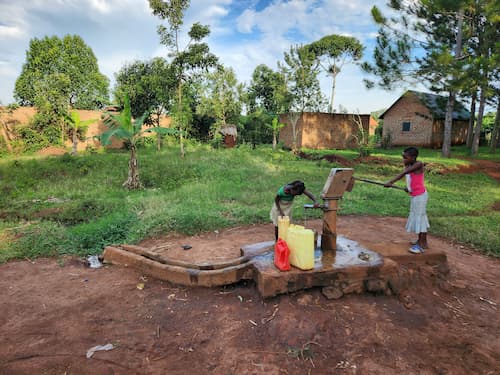
Girls pumping water
Bible Study
The next day they had a women’s bible study. Several ladies greeted us at the car and led us to a kids program.
The children recited Mark 10:14: “Let the little children come to me.”
We gave the bigger kids and teachers candy, and Gary’s friend Len gave the kids a football (a.k.a. soccer ball). Later, they gathered in a big circle and kicked the ball back and forth, each kick followed by a cheer.
Pastor Sam reviewed Ruth 1 in preparation of chapter 2. They split up into groups to discuss the questions he had prepared. (The handout included information on baptism which they would cover a week later.)
Again, they called us up to speak. This time, I shared a brief testimony and talked a little about Romans 12:1-2. When I did, I read the verses from a bible in the Luganda language (similar to Lusoga). I’d never read Luganda, and they laughed and clapped as I fumbled over the words.
Afterward, Steven said I did well and taught me how to say a few words in Lusoga.
They closed with singing.
Home Visits
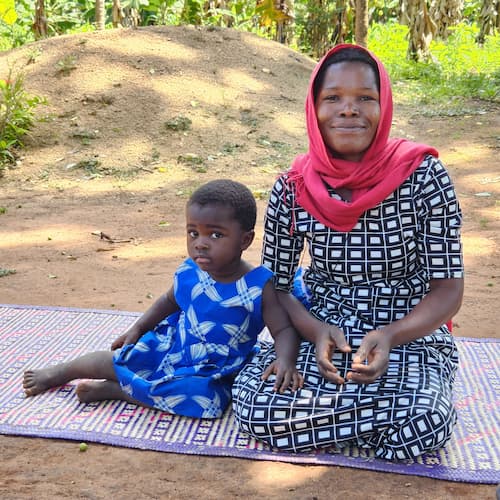
Fatina’s Home
A couple days later, we went to a few homes where Godfrey and Sam interviewed some ladies from the tailoring class. At each home we visited, we found poverty-stricken women with families, welcoming us with overflowing joy.
At the first house, Fatina greeted us with her daughter, Martha. During the interview, she said what an honor it was to have three mzungus (muh-ZOONG-gooz) (white people) come to her home. Partway through the interview, a neighbor’s pig wandered close, and she threw her sandal at it to shoo it away!
Mariam’s Home
At the next house, Mariam welcomed us with her brother and her 104-year-old mother. That same pig tried to interrupt our conversation there. Her brother ran it off with a stick.
In the last seven months, Mariam learned to read during the tailoring class. She showed us how, at sixty years old, she could now write her name.
Mariam’s mother was adorable with a near toothless smile and a twinkle in her eye. When we said good-bye, she rambled a string of words that fell on my uncomprehending ears. I gave her a hug, and she laughed like I’d just made her decade.
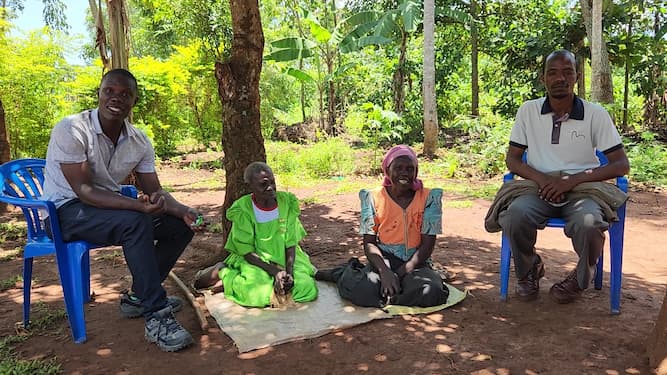
Godfrey, Mariam’s mother, Mariam, Pastor Sam
Olivia’s Home
We went to Olivia’s house next, where she met us with her baby, Pamela. Pamela started fussing in Godfrey’s arms in the middle of the interview. I held her so Godfrey could continue. When I returned her to her mother afterward, I discovered she’d peed on me!
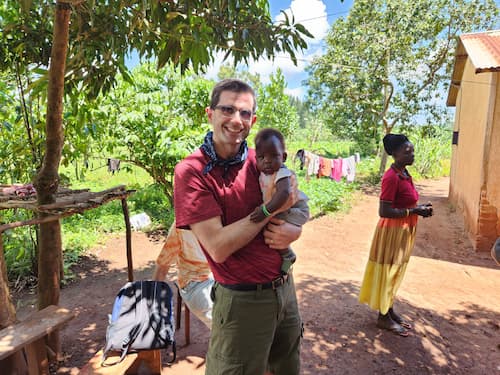
Me holding Pamela. Olivia in the background.
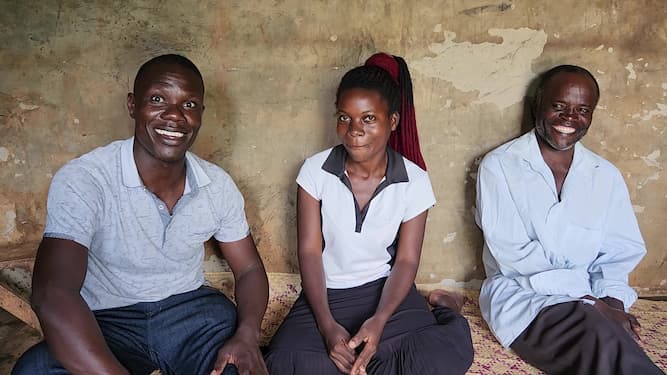
Godfrey, Prossy, and Robert
Prossy’s Home
At the last house, Prossy invited us inside where we met her husband and one of her daughters, home sick from school. Prossy and her husband had been married twenty-five years—a long time for a marriage in that area. Godfrey asked how they managed, and they said by love and working through their differences.
Baptisms
About a week later, I went to a church for the MCEC’s annual baptism service. Pastor Sam, Steven, many MCEC students, and some young men arrived in a rented bus. Pastor Sam invited me to assist with the baptisms, so I got in the water, too. As Steven played the guitar and the congregation sang, one by one, folks climbed in to be baptized.
Few, if any, had ever been in so much water before. Some clung to the walls and our hands as they stepped in. Several times, Pastor Sam encouraged them to relax.
He explained the process, I prayed for them by name, and together we lowered them under the water. When we raised them up again, symbolizing their new life in Jesus, everyone cheered, and some hollered endulus.
We baptized twenty-one ladies and half a dozen men and boys, and afterward, a few of them called me “Pastor Jake.” 😄
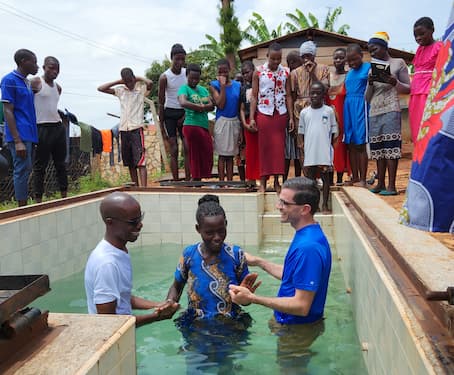
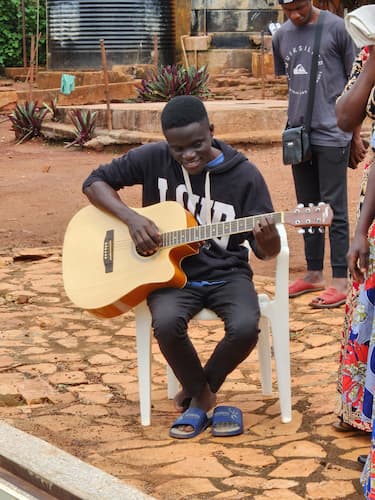
Steven gave me a traditional Ugandan shirt I ordered. Some ladies in the tailoring class made for me. It fit pretty well but with no wiggle room. I’d better not gain any weight!
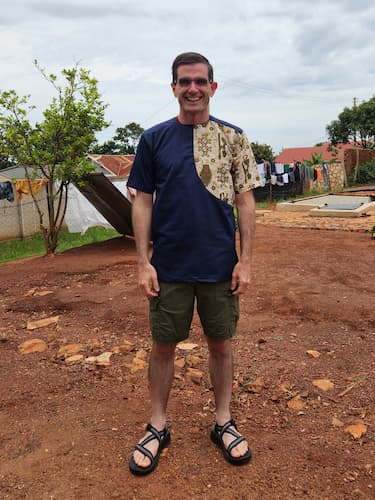
Irene, the MCEC board chaplain, tests the drum.
I delivered a drum to them (a gift from Gary), which they received with cheers and more endulus.
They left in their bus, and I waved both hands until they were out of sight. I could not keep the smile from my face.
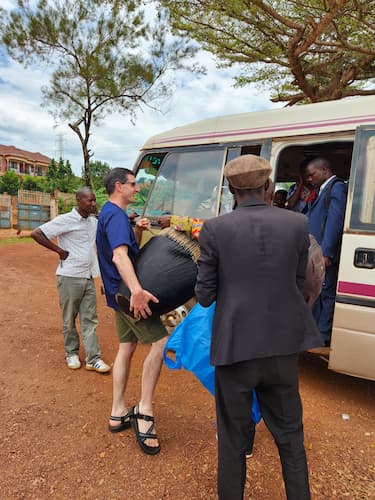
I delivered a drum to them (a gift from Gary), which they received with cheers and more endulus.
Irene, the MCEC board chaplain, tests the drum.
They left in their bus, and I waved both hands until they were out of sight. I could not keep the smile from my face.

Help
If you’d like to help people in Uganda like Fatina, Mariam, Olivia, Prossy, and their families, here are a couple of things you can do:
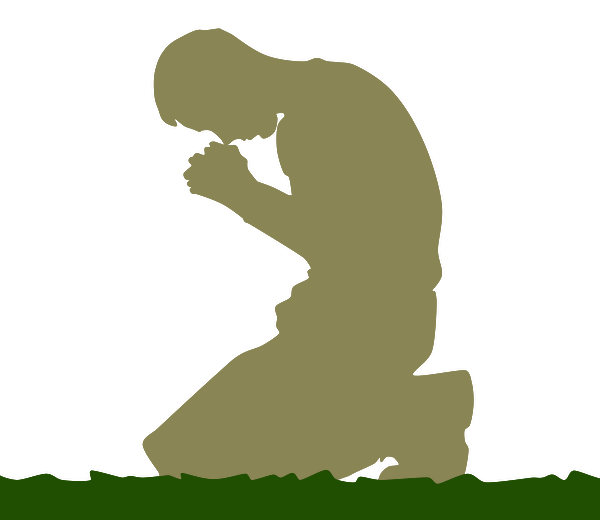
Pray
As Godfrey said:
“The best we can give is prayer. When God is in control, everything will be done.”
Or as King Solomon said in Psalm 127:1:
“Unless the Lord builds the house, they labor in vain who build it;”
Give
Hard work put the shipping containers in place, and each student at the center works hard to learn reading, writing, tailoring, and the bible. But shipping containers, paper, pens, cloth, sewing machines, and bibles all cost money.
If you’d like to give financially, you can give to the US non-profit, Global Ministry Partners.
Remember Hebrews 13:16:
“Do not neglect to do good and to share what you have, for such sacrifices are pleasing to God.”
Tell
By telling others about what’s happening at the Mayuge Christian Education Center, you can raise awareness. Of the need. Of God’s handiwork. Of how to join with God in blessing people.
Take a moment to share this page or the Global Ministry Partners page. In a text, email, phone call, online chat, or face-to-face conversation, share something here that impacted you.
“…the tongue of the wise brings healing.”
